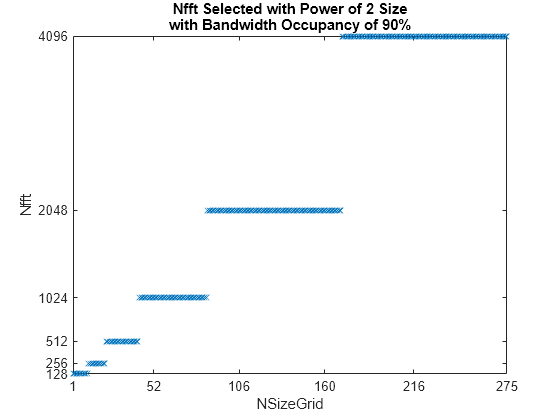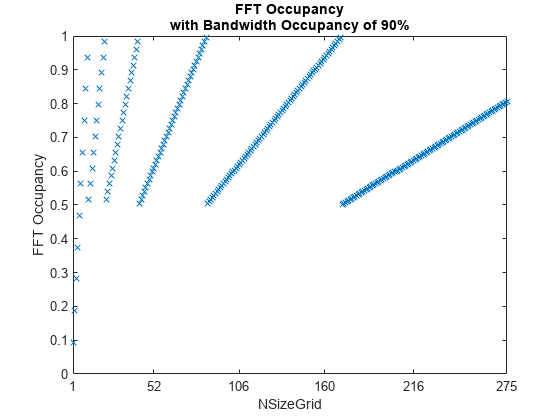Use Custom OFDM Sample Rate and Custom FFT Size
This example shows how to set custom values for the sample rate input, SampleRate, and the fast Fourier transform (FFT) size input, Nfft, when you call an OFDM function (nrOFDMModulate, nrOFDMInfo, or nrOFDMDemodulate).
Custom OFDM Sample Rate
The value that you set for the SampleRate input determines the sample rate of the waveform.
The nominal sample rate corresponding to the FFT size used in the OFDM modulation, , is equal to Nfft*carrier.SubcarrierSpacing*1000, where carrier is the input argument of the function call that specifies the carrier configuration.
Because the resampling of the OFDM-modulated waveform is by a factor of SampleRate/, the resampling is costly if SampleRate and do not have large common factors.
Custom FFT Size
The value that you set for the Nfft input must satisfy these conditions.
Nfftis an integer (to ensure integer-valued cyclic prefix lengths).Nfftis a power of 2.Nfftresults in a maximum occupancy of 100%. The actual occupancy is equal tocarrier.NSizeGrid*12/Nfft.
You can only achieve a bandwidth occupancy of exactly 100% when these conditions apply.
The FFT and the carrier grid have the same size. That is,
Nfftiscarrier.NSizeGrid*12.Resampling is not needed. That is,
SampleRateisNfft*carrier.SubcarrierSpacing*1000.
Plot Bandwidth Occupancy
Create a carrier configuration object.
carrier = nrCarrierConfig;
Set the SampleRate for each NSizeGrid such that the bandwidth occupancy (txBW/SampleRate) is 90%. Set Nfft to a power of 2.
nSizeGrids = 1:275; userSampleRateUserNfft = zeros(1,275); fftOccupancy = zeros(1,275); for nSizeGrid = 1:275 carrier.NSizeGrid = nSizeGrid; % Transmission bandwidth of OFDM waveform txBW = carrier.NSizeGrid*12*carrier.SubcarrierSpacing*1000; sr = txBW / 0.9; nfft = max(128,2^ceil(log2(carrier.NSizeGrid*12))); ofdmInfo = nrOFDMInfo(carrier,'SampleRate',sr,'Nfft',nfft); userSampleRateUserNfft(nSizeGrid) = ofdmInfo.Nfft; fftOccupancy(nSizeGrid) = carrier.NSizeGrid*12/ofdmInfo.Nfft; end
Plot the resulting FFT size.
figure; plot(nSizeGrids,userSampleRateUserNfft,'x'); title({'Nfft Selected with Power of 2 Size' 'with Bandwidth Occupancy of 90%'}); axis([1 275 min(userSampleRateUserNfft) max(userSampleRateUserNfft)]); xlabel('NSizeGrid'); xticks([1 52 106 160 216 275]); ylabel('Nfft'); yticks(2.^(7:12));

Plot the resulting FFT occupancy.
figure; plot(nSizeGrids,fftOccupancy,'x'); title({'FFT Occupancy' 'with Bandwidth Occupancy of 90%'}); axis([1 275 0 1]); xlabel('NSizeGrid'); xticks([1 52 106 160 216 275]); ylabel('FFT Occupancy');

Get OFDM Information
Update the carrier to 25 resource blocks (RBs).
carrier.NSizeGrid = 25;
Get OFDM information.
ofdmInfo = nrOFDMInfo(carrier)
ofdmInfo = struct with fields:
Nfft: 512
SampleRate: 7680000
CyclicPrefixLengths: [40 36 36 36 36 36 36 40 36 36 36 36 36 36]
SymbolLengths: [552 548 548 548 548 548 548 552 548 548 548 548 548 548]
Windowing: 18
SymbolPhases: [0 0 0 0 0 0 0 0 0 0 0 0 0 0]
SymbolsPerSlot: 14
SlotsPerSubframe: 1
SlotsPerFrame: 10
The CyclicPrefixLengths and SymbolLengths fields in the output structure return the cyclic prefix lengths and total OFDM symbol lengths for each OFDM symbol in a subframe. The total OFDM symbol length is composed of the cyclic prefix and the nominal OFDM symbol length equal to the FFT size.
ofdmInfo.SymbolLengths - ofdmInfo.CyclicPrefixLengths
ans = 1×14
512 512 512 512 512 512 512 512 512 512 512 512 512 512
Get OFDM information for a specified FFT size. Because OFDM symbol construction is performed using an IFFT of size that you specify in the Nfft input, the CyclicPrefixLengths and SymbolLengths fields return values in terms of this Nfft value. The specified Nfft value is also returned in the Nfft field of the output.
nfft = 640;
ofdmInfo = nrOFDMInfo(carrier,'Nfft',nfft)ofdmInfo = struct with fields:
Nfft: 640
SampleRate: 9600000
CyclicPrefixLengths: [50 45 45 45 45 45 45 50 45 45 45 45 45 45]
SymbolLengths: [690 685 685 685 685 685 685 690 685 685 685 685 685 685]
Windowing: 22
SymbolPhases: [0 0 0 0 0 0 0 0 0 0 0 0 0 0]
SymbolsPerSlot: 14
SlotsPerSubframe: 1
SlotsPerFrame: 10
ofdmInfo.SymbolLengths - ofdmInfo.CyclicPrefixLengths
ans = 1×14
640 640 640 640 640 640 640 640 640 640 640 640 640 640
Get OFDM information for a specified FFT size and sample rate. For the default sample rate, the number of time-domain samples of each OFDM symbol matches the values of the SymbolLengths field. If you specify the SampleRate input, the specified value is returned in the SampleRate field of the output. However, because of the CyclicPrefixLengths and SymbolLengths fields are expressed in terms of the IFFT size used during OFDM symbol construction, these values do not change in the output. The waveform is resampled to the sample rate that you specify after OFDM symbol construction. Depending on the sample rate, the length of the cyclic prefixes and nominal OFDM symbols in the corresponding OFDM waveform might not be an integer number of samples.
sr = 1.35 * nfft * carrier.SubcarrierSpacing * 1e3; ofdmInfo = nrOFDMInfo(carrier,'Nfft',640,'SampleRate',sr)
ofdmInfo = struct with fields:
Nfft: 640
SampleRate: 12960000
CyclicPrefixLengths: [50 45 45 45 45 45 45 50 45 45 45 45 45 45]
SymbolLengths: [690 685 685 685 685 685 685 690 685 685 685 685 685 685]
Windowing: 22
SymbolPhases: [0 0 0 0 0 0 0 0 0 0 0 0 0 0]
SymbolsPerSlot: 14
SlotsPerSubframe: 1
SlotsPerFrame: 10
ratio = ofdmInfo.SampleRate / (ofdmInfo.Nfft * carrier.SubcarrierSpacing * 1e3)
ratio = 1.3500
disp(num2str(ofdmInfo.SymbolLengths*ratio,'%0.3f '));931.500 924.750 924.750 924.750 924.750 924.750 924.750 931.500 924.750 924.750 924.750 924.750 924.750 924.750